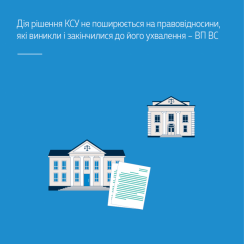Contact center of the Ukrainian Judiciary 044 207-35-46
ABOUT THE SUPREME COURT
FOR CITIZENS
ACTIVITY
PRESS-CENTER

An individual complaint against inaction of the officials of the prosecutor's office as to failure to enter data about the criminal offense in the Unified State Register of Pre-Trial Investigation has been dismissed by ruling of investigating judge. The appellate and cassation courts refused to commence proceedings on complaints against the said ruling.
When appealing to the Grand Chamber of the Supreme Court, the applicant referred to the Decision of the Second Senate of the Constitutional Court of Ukraine (CCU) of 17 June 2020 No 4‑ð(²²)/2020 in case No 3-180/2018(1644/18), which declared unconstitutional the provisions of Part 3, Article 307 of the Code of Criminal Procedure of Ukraine as to the prohibition to appeal against decision of the investigating judge based on the results of consideration of the complaint about inaction of the investigator, prosecutor in part of failure to enter information about the criminal offense in the Unified State Register of Pre-Trial Investigation, following the receipt of application, notification of criminal offense.
In view of this, a person sought to reñonsider in exceptional circumstances the Ruling of the Criminal Cassation Court of the SC of 25 October 2019 on refusal to grant opening of cassation proceedings on his complaint, to cancel it and to rule opening of cassation proceedings.
Having considered the application, the Grand Chamber of the Supreme Court found that there were no grounds for its granting based on the following. The decision of the CCU has a direct (prospective) effect in time and is applied with regard to ongoing legal relations or those, emerged following its adjudication. If the legal relations are long lasting and had been emerged before the CCU’s decision, but continued to exist after its adjudication, then the effect of the CCU’s decision extends to them. In the operative part of referred decision, it is said that the provision of Part 3 of Article 307 of the Criminal Procedure Code of Ukraine becomes ineffective from the date of this decision.
At the same time, the Grand Chamber of the Supreme Court took the notice of the fact that unconstitutionality (constitutionality) of the law, other legal act or their separate provision, which was found by the Constitutional Court of Ukraine and applied (not applied) by the court when deciding the case, is important, first of all, as a decision of general nature, qualifying legal position for consideration of incoming cases, rather than a basis for reconsideration of the case with retrospective application of the new legal position and, so changing the state of legal certainty, currently established by the final court decision (clause 9.9 of the Resolution of the Commercial Cassation Court of the SC of 29 October 2019 in case No 922/1391/18).
The Ruling of the Criminal Cassation Court of the SC, which the applicant sought to reconsider in exceptional circumstances, was adjudicated on 25 October 2019 under the then norms of effective CPC of Ukraine. However, as of the time when the CCU adjudicated its decision, regarded by the applicant as exceptional circumstance (17 June 2020), the criminal-procedural relations in the analyzed criminal proceedings had already ceased. That means that the CCU’s decision cannot be applied to these legal relations, as they emerged and ceased before its adjudication.
Full text of the Resolution of the Grand Chamber of the Supreme Court of 18 November 2020 in case No 4819/49/19 (proceedings No 13-76çâî20) is available at: https://reyestr.court.gov.ua/Review/93081749.